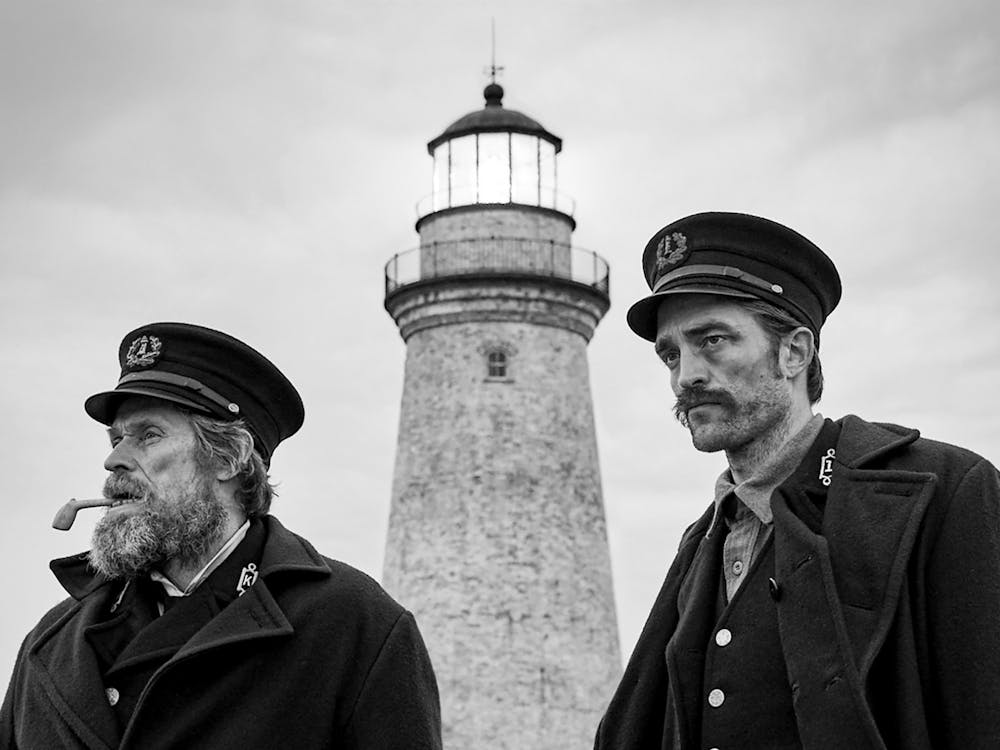Divorced from visuals and performances, Robert Eggers’s screenplays read like landmark pieces of American theater still studied and performed for their enduring relevance. Though ostensibly marketed as horror films, his movies are historical dramas at heart, so deeply researched and written in such dense, archaic language that they serve as roadmaps into specific eras of American history.
His debut film “The Witch” was a surprisingly successful glimpse into the dreary, overwhelmingly God-fearing life of a Puritanical family in New England, an atmospheric folktale that rivaled “The Crucible” in its detailed exploration of how religion and gender dynamics foster chaos. In a year of sophomore features — with Jordan Peele and Ari Aster also releasing highly-anticipated second films — the pressure was on for Robert Eggers to once again deliver a chilling, thematic horror-drama.
“The Lighthouse” proves that Eggers is more than a book-smart one-hit wonder: he is a veritable force to be reckoned with, a contemporary writer-director with the sensibilities of his ‘70s predecessors and turn-of-the-century poets. Filmed with Lynchian black-and-white cinematography and scored primarily by the ambient wails of a foghorn, “The Lighthouse” is a tempest in a bottle, a carefully calibrated psychological thriller posing as if it is out of control. By turns Shakespearean and almost Apatow-ian in its bizarre stabs of comedy, the film effortlessly blends a host of influences — “The Shining,” “The Rime of the Ancient Mariner,” the legend of Prometheus — into something entirely new, drenched in ambience and bodily fluids.
The movie’s premise is simple: two men occupy and operate an island lighthouse in late 19th century New England, barely disguising their contempt for one another. Robert Pattinson is the reserved lackey Winslow working under the rule of his grizzled, abusive boss Thomas Wake, played with delicious contempt by Willem Dafoe. When the relief that was promised to them never arrives, the pair turn to every possible measure — drinking, fighting, dancing — to stave off insanity and cope with their hatred of the other.
While “The Lighthouse” is definitely a showcase for Eggers’s direction and writing, it is also a career high for both Dafoe and Pattinson. Tasked with difficult filming conditions and near incomprehensible dialogue, Dafoe and Pattinson tackle their respective roles with appreciable bite, oftentimes disappearing into their characters. Pattinson has effectively shed his reputation as wooden pretty-boy star of the “Twilight” franchise, turning in an initially quiet performance that bubbles and boils into a raging descent into vindictive madness attenuated by his impressive physicality and resentful Kubrickian star. Dafoe is magnetic even in his most repulsive moments, his mad grin and sandy voice transporting his character from mean drunk to a truly tyrannical figure that digs itself under the audience’s skin just as it does Winslow’s own. They never outshine each other though, choosing instead to constantly one-up each other in acts of twisted showmanship until finally burning themselves out in a tremendous, operatic burst.
Unlike “The Witch,” which harnessed dramatic irony by revealing that the witch was real long before any characters knew otherwise, “The Lighthouse” purposely keeps its straightforward story shrouded in mystery. Although the characters are surrounded by endless swaths of sea, they are crammed together into their claustrophobic cabin, every corner of which hides another secret or ominous shadow. The use of light and imagery is hauntingly stellar in its ability to both reveal and conceal, adding another brick to the narrative while ripping another hole through the characters’ psyches.
“The Lighthouse” is nearly perfect on a technical level — from the sharp editing to the shiveringly bleak cinematography to the subdued sound design — but it is the film’s weirder tendencies and jarringly sexual themes that make it so uniquely wonderful. Eggers doesn’t shy away from depicting the behavior of men stranded without female company, synthesizing the yonic imagery of pits and mermaid gills with the phalli of writing tentacles and towering lighthouses into a powerful orgy of homoeroticism that eventually teeters into toxic masculinity. Enriched by the conventions of the time period — Winslow is often humiliated by his chores not because they’re difficult, but because he feels like a “housewife” — the dissection of how men behave when constantly reminded of their animalistic nature and deprived of women to feel superior to plays out with horrific grace in Eggers’s capable hands.
A movie with so much slippery nudity and gross-out humor might not seem on par with the epic sailor tales and watershed psychological horror films that preceded it, but “The Lighthouse” is another masterwork from Robert Eggers. Grounded in historical drudgery with occasional striking flashes of fantasy, it is an enchanting exhibition of talent on the part of every cast and crew member, as disgusting as it is compelling. Like a catchy sea shanty, its language is inscrutable and its connotations bizarre, but it will worm its way into even the most guarded brains and stay there.
Get The Chronicle straight to your inbox
Signup for our weekly newsletter. Cancel at any time.

